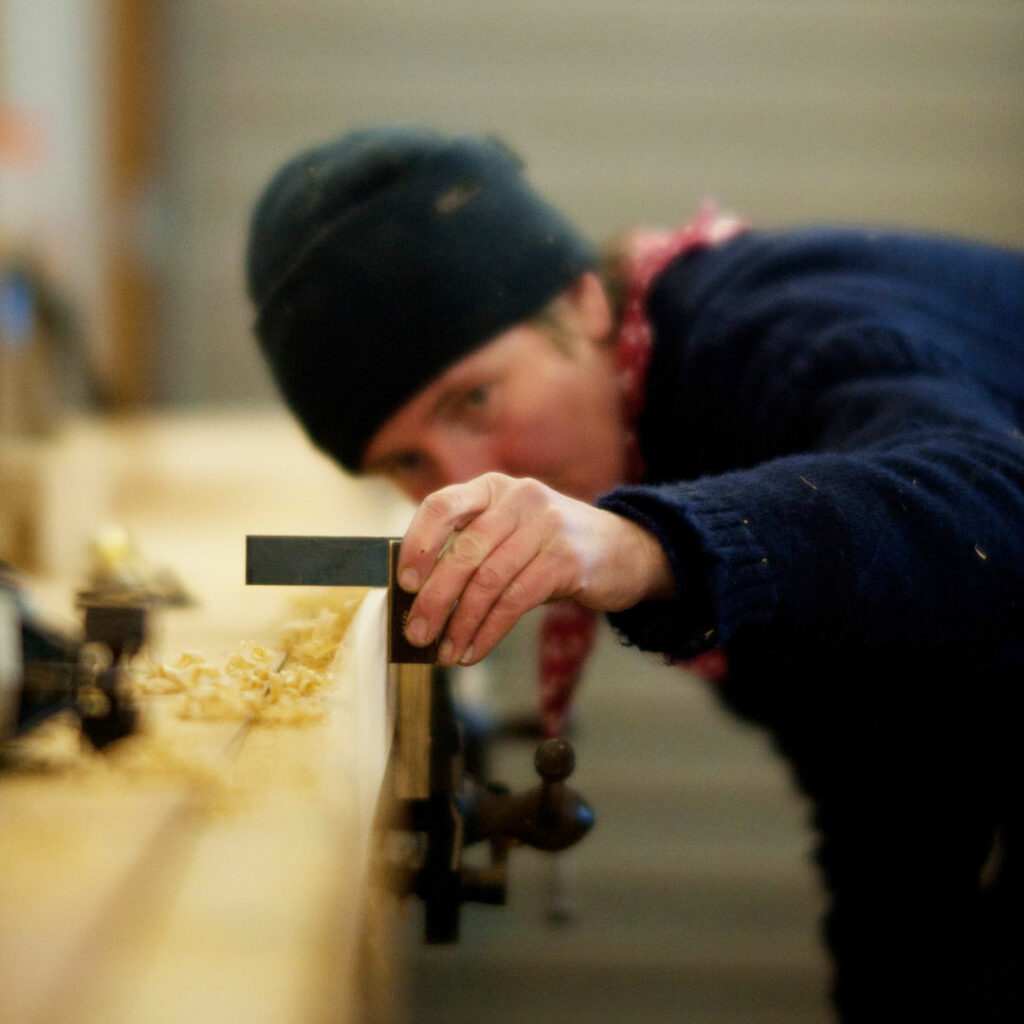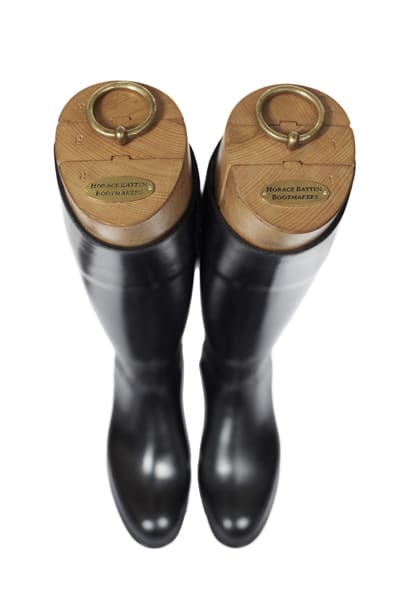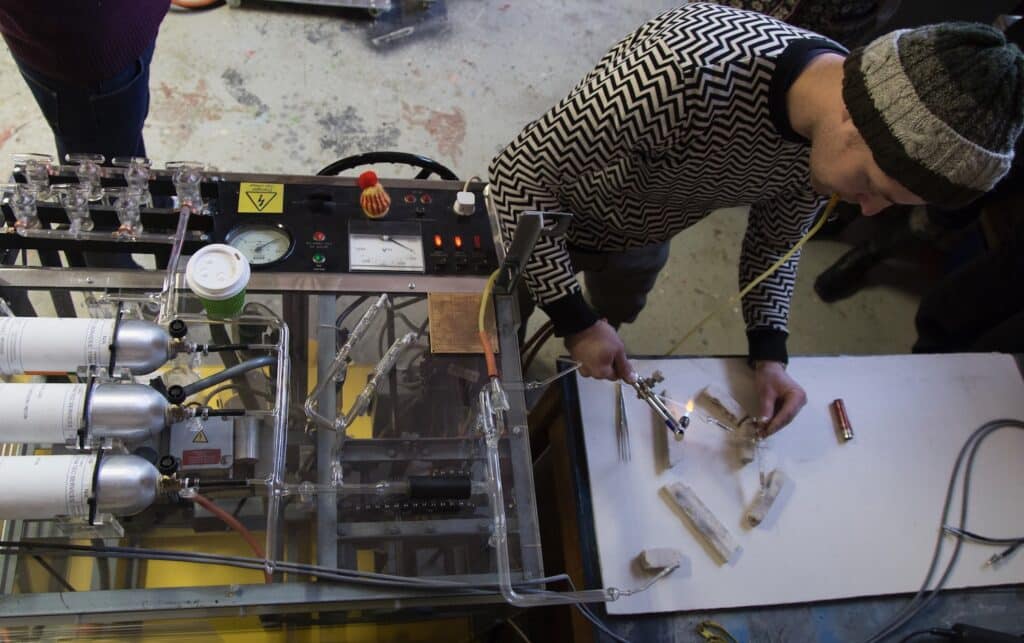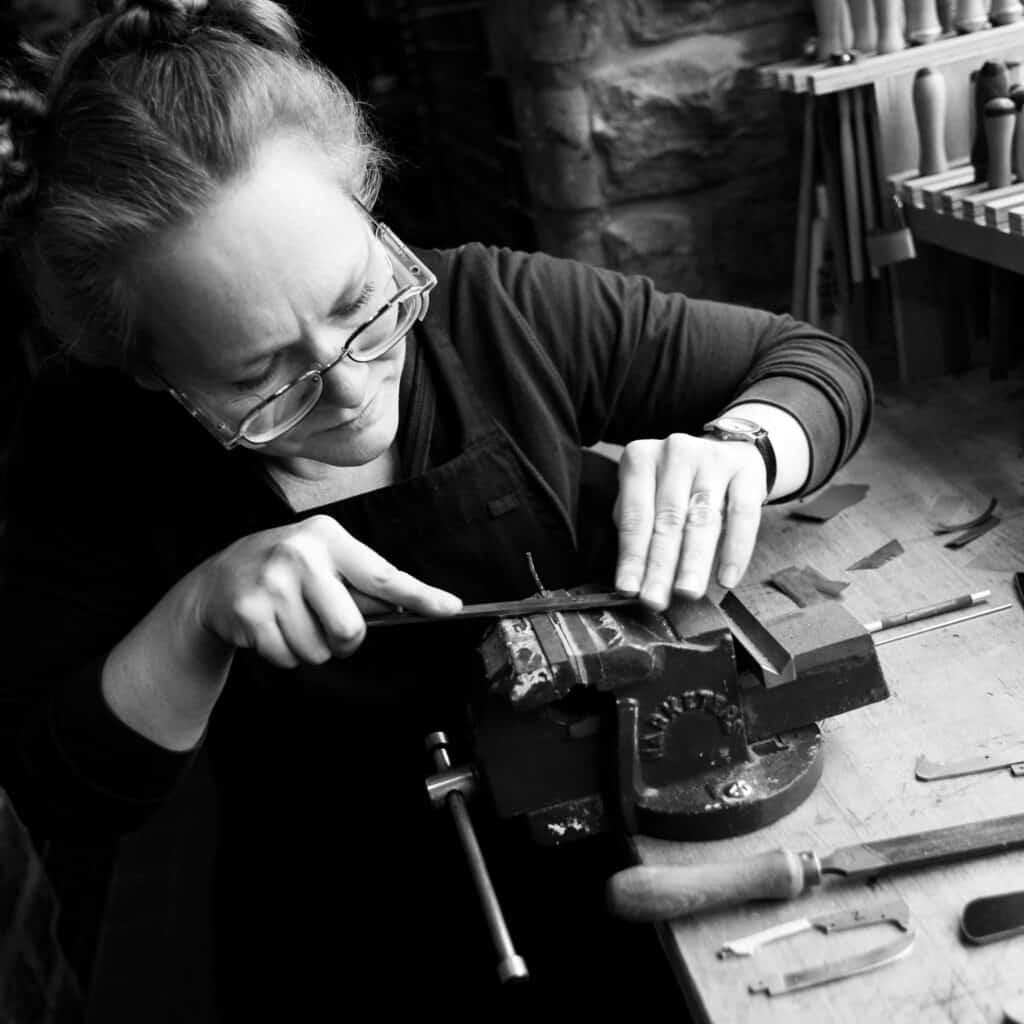Endangered Crafts Fund
Small grants to help the most at-risk crafts

OPEN FOR APPLICATIONS
Deadline: Friday 8 May 2026, 5pm
Heritage Crafts invites craft practitioners and organisations in the UK to apply for small grants to fund projects that support endangered crafts (the craft must be listed as endangered or critically endangered on the current Red List of Endangered Crafts). A number of grants are ringfenced for Essex, East Sussex, West Sussex, and Brighton and Hove, but those outside of these areas are also eligible to apply.
Heritage Crafts published the fifth edition of its groundbreaking Red List of Endangered Crafts in May 2025, the first research of its kind to rank the UK’s traditional crafts by the likelihood that they will survive into the next generation. The report assessed 285 crafts to ascertain those which are at greatest risk of disappearing, of which five were classified as extinct, 93 as ‘endangered’ and a further 72 as ‘critically endangered’. As a result of this alarming threat to our cultural heritage, Heritage Crafts set up its Endangered Crafts Fund in 2019 and 79 grants have been awarded nationally in that time.
Applications may, for example, include:
Implementing changes that will ensure the longer-term viability or survival of heritage craft skills, for example:
- developing a new, innovative approach to heritage craft skills;
- investing in more efficient machinery;
- developing new routes to market;
- exploring the use of sustainable alternative materials while maintaining the heritage character of your practice.
Direct and indirect skills transfer, for example:
- taking on a trainee or apprentice;
- preparing to teach courses, including the creation of training materials;
- online or video content to support skills sharing and documentation;
- specialist tools and equipment to facilitate training.
Continuous professional development, for example:
- acquiring the knowledge and skills required to run a successful small business;
- acquiring the advanced craft skills or allied craft skills necessary to make a craft practice more viable, e.g. through a training course or self-directed learning.
In addition to the funding you will receive support from Tess, the Recipient Engagement and Impact Lead and rest of the Heritage Crafts team to ensure that your project is a success. This will be unique to your project but it could include mentoring support, business support or signposting to other opportunities.
We encourage you to take time to read the full FAQs before applying:
- Frequently asked questions
- Application questions for reference
- Watch a recording of our most recent Q&A session here
- Join our next online Live Q&A Session for grants, awards and bursaries on Tuesday 7 April
APPLY FOR THE ENDANGERED CRAFTS FUND
DEADLINE: 5pm on Friday 8 May 2026
Video or Audio Applications: Alternatively, you are welcome to submit a video or audio application, addressing all the questions in the form and specifically highlighting your commitment to your craft. You can download the questions here: Application Questions – The recording ideally needs to be no more than 15 minutes in length. Then email it to Rae here: [email protected]
Supported by: the generous support of individual donors and the Julia Rausing Trust. Previous donors include the Pilgrim Trust, the Radcliffe Trust, the William Grant Foundation, the Sussex Heritage Trust, the Ashley Family Foundation, the Dulverton Trust, the Garfield Weston Foundation, the Prince of Wales’s Charitable Fund, the Benefact Trust, the Essex Community Foundation and the Ernest Cook Trust.
Thank you so much to Heritage Crafts for awarding the Endangered Craft Fund grant to Building Futures Galloway. The grant will enable us to acquire specific hand tools that are vital to the teaching of the craft of traditional wooden boat building. The passing on of these skills to the younger generation will help safeguard the future of this endangered craft.
Gail McGarva BEMBoat builder

Grants awarded to date
Here is a list of the 95 projects funded so far:
- Catherine Ade, lithographer – to run a series of workshops on different lithography techniques and continue to supply lithography plate graining services (Bristol).
- James Allen, tanner – to buy a lime tank for the production of traceable vegetable-tanned leather from cattle hides (Wiltshire).
- Amersham Museum – to run workshops and a remote peer-learning network for straw hat plaiting with support from Veronica Main MBE, and become a hub for the craft, supplying tools and materials (Buckinghamshire).
- Peter Ananin, oak bark tanner – to train an apprentice in the skills and knowledge of traditional Scottish bark tanning (Fife).
- James Anderson, hat maker – to restore antique straw hat making machines and buy a boater hat block for his blocking machine, as part of his mission to revive straw hat making in the town (Luton).
- Scot AnSgeulaiche, Highlands and Islands thatching – to train an apprentice in the craft of Highlands and Islands thatching and encourage the use of locally-grown thatching materials (Perthshire).
- Elizabeth Ashdown, passementerier – to enhance her existing practice by learning high-level passementerie skills from expert Clare Hedges (London).
- James Ashwell, clay pipe maker – to 3D print new pipe moulds from scans of historical clay pipes and take up residency at Broseley Pipeworks to test the moulds using a real gin press (Bristol).
- Andrew Basham, thatching spar maker – to learn to make thatching spars from the last spar maker in East Anglia, and equip himself for production from his hazel coppice (Essex).
- Poppy Bastin – to re-establish commercial textile block printing at Yateley Industries for the Disabled by training staff and running community classes (Hampshire).
- Horace Batten, boot makers – to train an apprentice boot tree maker who will go on to work in-house at the boot making firm (Northamptonshire).
- Katie Beard, type founder – to apprentice to type founder Stanley Lane, to safeguard the history and craft of metal type manufacture and letterpress book printing (Gloucestershire).
- Eddy Bennett, reverse glass sign artist – to purchase a plotter to cut vinyl etching stencils and provide custom stencils to other reverse glass sign artists in the region (Brighton).
- Duncan Berry, flint waller – to buy tools to enable him to pass on his skills as a flint waller (West Sussex).
- Robert Bigio, flute maker – to train an apprentice flutemaker through making a copy of a historical concert flute (London).
- Ben Bosence, brick and tile maker – to develop and make bricks and tiles from waste clay that has been excavated locally (East Sussex).
- Tom Boulton, letterpress printer – to do a feasibility study into creating new wooden type for letterpress printing using CNC machining (West Sussex).
- Deborah Bowness, wallpaper maker – to learn traditional wallpaper making techniques through one-to-one training with a wallpaper conservationist (East Sussex).
- Britannia Sailing Trust – to train two young people in boat building as part of the restoration of the 110-year-old wooden sailing vessel Britannia (Exeter).
- Simon Brock, clog maker – to secure a new workshop space for clog making after an unexpected change in situation left a question mark over his ability to continue in the craft (Sheffield).
- Hannah Buchanan, industrial ceramicist – to buy a plaster lathe for traditional ceramic mould making, and learn to make block and cases for slip casting (Derbyshire).
- Justine Burgess, basket maker – to train in Teifi and Tywi coracle making so that she can pass on the skills to others (Carmarthen).
- Sarah Burns, textile block printer – to install two large dye kettles to increase her output and make the business more sustainable whilst upskilling her apprentice (West Sussex).
- Owen Bushell, millwright – to learn the millwrighting skills to maintain and operate an historic bucket mill producing wooden stave buckets (Aberdeenshire).
- Monica Cass, chair seater – to train a chair seat weaver in skeined willow techniques, and document the process (Norwich).
- Paul Chamberlain, reverse glass sign maker – to create short films to support the teaching of the craft of reverse-glass sign making (Norfolk).
- Chatham Historic Dockyard Trust – to 3D scan a working ‘side traveller’ rope making machine, to enable more effective repair and maintenance (Kent).
- Maurice Clother, rake maker – to procure tools to train his apprentice and to market their rakes (Herefordshire).
- Coates Willow, basket makers – to forge new tools for an apprentice working with one of the last practicing basketwork furniture makers (Somerset).
- Kate Colin, fan maker – to develop the technical skills of fan making with a view to teaching the craft in future (Glasgow).
- Kevin Copeland, green woodworker – to train in traditional wooden rake making in order to pass these skills on to Veterans’ Growth service users and the wider community (East Sussex).
- Collette Davies, basket maker – to help revive the craft of lipwork straw basketry (Monmouth).
- Michelle Dawson, stained glass restorer – to supplement her glass restoration practice by learning high-level reverse-glass sign making skills from David A Smith MBE (Dorset).
- Samantha Dennis, coiled basketmaker – to catalogue and replicate historical coiled baskets of Shetland and create a market for small crofters to sell locally-grown oat straw (Shetland)
- Samantha Dennis and Eve Eunson, thatchers – to support the burgeoning oat straw economy on Shetland by developing vernacular thatching on the islands (Shetland).
- Hugh Dunford-Wood, wallpaper maker – to create short films to support the teaching of the craft of hand-blocked wallpaper making throughout the UK and beyond (Dorset).
- Eve Eunson, Fair Isle chair maker – to record the skills of Fair Isle straw back chair making in a film that can be used to train others (Shetland).
- Rachel Evans, basketmaker – to learn the techniques of hazel basketmaking, specifically the Gower cockle basket and the whisket (Stoke-on-Trent).
- Ruth Farris and Bea Uprichard (silk damask weavers) – to develop new products and routes to market for silk woven at the historic Paradise Mill (Macclesfield).
- Stephanie Firth, shoemaker – to start up a business specialising in handmade bespoke orthopaedic shoes (Derbyshire).
- Framework Knitters Museum – to manufacture, purchase and install new prototype bearded needles for their stocking frames, and train volunteers in their use (Nottingham).
- Birgit Frietman and Robyn Smith, horn workers – to set up a hub for horn working in London and reduce their carbon footprint by completing more processes in-house (London).
- Tom Frith-Powell, paper maker – to develop a gelatine sized paper as part of his commercial handmade papermaking charity (Cumbria).
- Bob Green, flint waller – to buy tools to enable him to develop and pass on his skills as a flint waller (Brighton).
- Steve Hogarth, building restorer – to add the skills of leadworking and flint masonry to his steeplejack business, maintaining the usefulness of traditional buildings without the impact of scaffolding (Derbyshire).
- William Holland, arrowsmith – to develop his arrowsmithing skills and master the reproduction of historically forged arrow heads, and to teach the craft to others (Carmarthenshire).
- Grace Horne, scissor maker – to create dies for the production of hot drop-forged scissor blanks that can be used by Grace and other makers to produce bespoke scissors (Sheffield).
- Lizzy Hughes, coppersmith – to develop her coppersmithing skills to include joinery, so that she’s able to make objects constructed from multiple parts such as buckets, watering cans and funnels, and to teach the craft (London).
- Oliver Hymans, marionette maker – to run marionette making course for puppetry professionals and practitioners at the Little Angel Theatre (London).
- Scott Jeffrey, clockmaker – to fund the setup of wheel and pinion cutting in his clockmaking workshop, and offer wheels and pinions to the trade (Hampshire).
- Seth Kennedy, watch case maker – to refurbish and provide storage for specialised tools, to be used to teach horologists and silversmiths to become watch case makers (Hertfordshire).
- Charlotte Kenward, reverse glass artist – to train and equip herself to offer traditional reverse gilded house numbers and signage to heritage properties (West Sussex).
- Anna Kettle, pargeter – to create short films to support the teaching of the craft of pargeting (Bedfordshire).
- Nicholas Konradsen, musical instrument maker – to research and make Lincolnshire bagpipes in a new workshop with more energy-efficient equipment (Lincolnshire).
- Nikki Laird, kiltmaker – to print a book on how to make a traditional hand sewn kilt (Edinburgh).
- Jessica Light, passementerier – to train apprentice Anna Ray in the craft of passementerie, and together explore new routes to market (London).
- Little Angel Theatre – to equip a new dedicated marionette-making workshop to practice and teach the craft (London).
- Kate Longley, withy pot maker – to maintaining the skills and knowledge of withy crab and lobster pot making in the community of Gorran Haven (Cornwall).
- Steven Lowe, shoe last maker – to provide shoe last making courses covering including heel making (East Sussex).
- Alan MacPherson, shinty caman maker –to provide three-phase electricity to increase production of shinty camans and eventually host an apprentice (Inverness).
- Fred Maillardet, millwright – to train milling volunteer Adam Winsor to be a millwright at Oldland Windmill in West Sussex and Wicken Windmill in Cambridgeshire (West Sussex).
- Warren Martin, silver spinner – to train with Christopher Perry on hammering techniques to form pouring lips on his spun silver vessels (Sheffield).
- Michael May, folding knife maker – to equip his folding knife making apprentice with the tools he needs to learn all aspects of the trade (Sheffield).
- Lucy Mayes, pigment maker – to purchase equipment to produce a range of innovative and sustainable pigments from processing construction waste (London).
- Gail McGarva BEM, boat builder – to equip a community workshop on the Solway Firth with tools needed to teach young people traditional clinker boatbuilding (Dumfries and Galloway).
- Gail McGarva BEM, boat builder – to secure a barn top become the Traditional Boat Building Beacon, in which to teach regional clinker-built boat construction (Dumfries and Galloway).
- Jake Middleton-Metcalf, concertina maker – to be trained in making the critical working components of the English system concertina (Buckinghamshire).
- Tony Millyard, flute maker – to pass on flute making skills and to develop a new model of flute (Northamptonshire).
- Simon Nobs, woodgrainer and marbler – to develop and run a series of accessible and accredited courses in the paint effects of wood graining and marbling, expanding on his existing YouTube tutorials (Kent).
- Mark Norris, harp maker – to help open a school of harp making and develop a curriculum of tuition before the craft dies out in Scotland (Scottish Borders).
- Edie Obilaso, hat maker – to make hats from straw plait produced on an antique machine, and to document the craft (London).
- Dominic Parrette, green woodworker – to build shave horses to allow him to teach trainees how to make Sussex trug and Devon stave baskets (East Sussex).
- Craig Peebles, encaustic tile maker – to develop a reliable clay slip to reduce failure rates for encaustic tile making in a small studio setting (Edinburgh).
- Dave Purvis, coracle maker – to recreate six extinct coracle types and work with the UK Men’s Sheds Association to popularise the craft (North Yorkshire).
- Ratsey & Lapthorne, sail makers – to train an apprentice sail maker to craftsman level while making sails for a historic yacht (Isle of Wight).
- Raybel Charters CIC, boatbuilders – to train Alanna Cameron in mast setting and re-rigging, and further develop the skills of existing boat builder Laurie Watkin for the completion of Raybel, a 104-year-old Thames sailing barge (Kent).
- Sarah Ready, withy pot maker – to develop her practice as a withy pot maker, producing pots for her son to fish with off the Devon coast, and to document the craft (Devon).
- Anna Rennie, maille maker – to apprentice to master maille maker Nick Checksfield, to learn how to restore and preserve original maille, and to become the first female professional maille maker (Cornwall).
- Clare Revera, basket maker – to develop and teach a Level 3 City & Guilds course on rare and endangered basket making skills at Westhope College (Glamorgan).
- Mark Rochman, bicycle maker – to gain bicycle frame making skills from Ellis briggs Cycles and add bicycle making to the offering of Leeds Bike Mill, a workers cooperative currently offering bicycle repair and maintenance (Leeds).
- Karl Schmidt, tinsmith – to reintroduce the critically endangered craft of tinsmithing to the UK through a specialist tinsmithing masterclass (United States).
- Rob Shaw, coach trimmer – to equip the coach trimming workshop of Embsay & Bolton Abbey Steam Railway to train more people in the community (North Yorkshire).
- Mark Shiner, sail maker – to research the ‘spanker’ sail from information available at the Mystic Seaport Museum, Connecticut, reviving methods and materials no longer used in traditional sail making (Orkney).
- Lorna Singleton, swill basket maker – to buy a boiler and swiller’s mares (a special type of shave horse) to enable her to teach oak swill basket making to small groups (Cumbria).
- James Slaven, sailmaker – to train in sailmaking with Mark Shiner and set up a workshop at the GalGael Trust making and repairing sails and repurposing old sailcloth (Glasgow).
- Travis Smith, hewer – to train in hand hewing of timber and apply his skills to the restoration and reconstruction of historical building and the construction of new ones (Hampshire).
- Gillian Stewart, bookbinder – to expand her bookbinding practice by training as a disappearing fore-edge painter, and to teach the craft (Glasgow).
- Stephanie Turnbull, lithographer – to trial the use of alternative types of limestone and other stone substrates for lithographic printing, and to publish her findings (Newport).
- Alex Ward, furniture maker – to develop his furniture making business to incorporate the production of moulding planes for fine furniture making, and to teach the craft of plane making (Shetland).
- Lois Walpole, basket maker – to publish a book on the critically endangered craft of kishie basket making (Shetland).
- Zoë Watson, kiltmaker – to train as a professional kiltmaker at the Kiltmakery in Edinburgh, after doing an introductory course as a 16-year-old student (Perthshire).
- Jessie Watson-Brown, Matthew Bailey and Jamey Rhind-Tutt, oak bark tanners – to equip a new tannery to produce traditional bark-tanned leather from wild deer skins (Devon).
- Richard Wheater, neon bender – to build a mobile neon bombarding and vacuum facility to teach neon bending to beginners and intermediate trainees (West Yorkshire).
- Deborah White, damask weaver – to restore and use a loom to teach damask weaving to a new generation of weavers (Northern Ireland).
- John Wills, coppersmith – to set up a tinsmithing and coppersmithing workshop that will also provide teaching, using renewable charcoal to heat the traditional soldering coppers (Northamptonshire).



